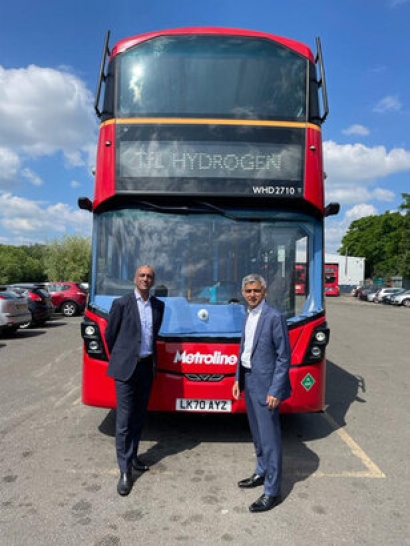
The 20 new environmentally-friendly buses, the first of their kind to be launched in England, will produce no pollution from their exhausts and join more than 500 electric buses in the core fleet which are already zero-emission. The new hydrogen fuel cell double decker buses are first being introduced on route 7 between East Acton and Oxford Circus.
Hydrogen used in a fuel cell is free from harmful emissions. The only by-product is water from the chemical reaction of hydrogen with oxygen from air, a process that produces electricity to power the bus. The buses will help clean up the air and improve the health of Londoners by reducing the level of harmful nitrogen oxide in the air. Passengers will benefit from smoother, quieter journeys due to fewer vibrations and will be able to take advantage of free-to-use USB charging points.
The Mayor’s green transport investment is also supporting jobs across the UK. The buses were manufactured by Wrightbus in Northern Ireland, helping to create new jobs, and the gas cylinders are manufactured by Luxfer in Nottingham. The hydrogen for the buses is currently being produced at Air Liquide’s plant in Runcorn, harnessing waste hydrogen as a by-product from an industrial chlor-alkali plant. Oxford-based Ryze Hydrogen is responsible for transporting the fuel to the fuelling station. From 2023, the hydrogen will be even greener as it will be produced by electrolysis powered by a direct connection to an offshore windfarm.
A new, state of the art fuelling station completed by Danish engineering firm Nel Hydrogen will top up each hydrogen fuel cell bus just once per day in as little as five minutes.
In addition to around £6 million of funding from TfL, more than £5 million of funding has been provided by European bodies - by the Fuel Cells and Hydrogen Joint Undertaking, and the Innovation and Networks Executive Agency (INEA), an executive agency of the European Commission – as well as £1 million from the Office of Zero Emission Vehicles.
TfL has paved the way for cheaper hydrogen buses across the rest of the UK, having led the UK procurement within the Joint Initiative for Hydrogen Vehicles across Europe (JIVE), to buy in bulk with other UK authorities. In total, the JIVE project seeks to deploy 139 new zero-emission fuel cell buses and associated refuelling infrastructure across five European countries and has received funding from the Fuel Cells and Hydrogen Joint Undertaking.
With sustained financial support from the Government, TfL could look to accelerate its plans for a zero-emission bus fleet from 2037 to 2030 in order to reduce carbon emissions and address the public health emergency caused by dirty air.
“We have made real progress in London to clean up our air, but we still have a long way to go because toxic air pollution in our city is still leading to thousands of premature deaths every year and is stunting the growth of children’s lungs” said Mr Khan. “As part of our world-leading ongoing efforts, I’m proud to announce England’s first hydrogen double decker buses, which don’t produce any harmful emissions, will now be put into service. Our investment in these hydrogen buses is not only helping us to clean up London’s air, but is supporting jobs and local economics across the UK. This is a great demonstration of how tackling air pollution and the climate crisis and boosting economic growth is about regions working together, investing in the very latest technology. I’ve worked hard to ensure TfL’s entire core bus fleet across London now meets the ULEZ standards, and this includes 500 electric buses. Our new investment in hydrogen buses will move us even closer to our ambition of making all London buses zero-emission by 2030.”
Interim Director of Buses, Transport for London, Geoff Hobbs, added that London may have one of the cleanest bus fleets in Europe, but the city needs to continue to act now to tackle climate change and the city’s toxic air quality.
“Introducing these hydrogen double decker buses to our fleet, alongside electric buses, diversifies our green bus portfolio and helps us use the right technology for the varying operational requirements of our vast network” Mr Hobbs said. “This will help Londoners breathe cleaner air. Our investment in hydrogen won’t just benefit London, either. Outside the capital, we are supporting jobs across the UK and our involvement with the industry across Europe is making cleaner fuels more affordable to cities all over Europe.”
For additional information:

